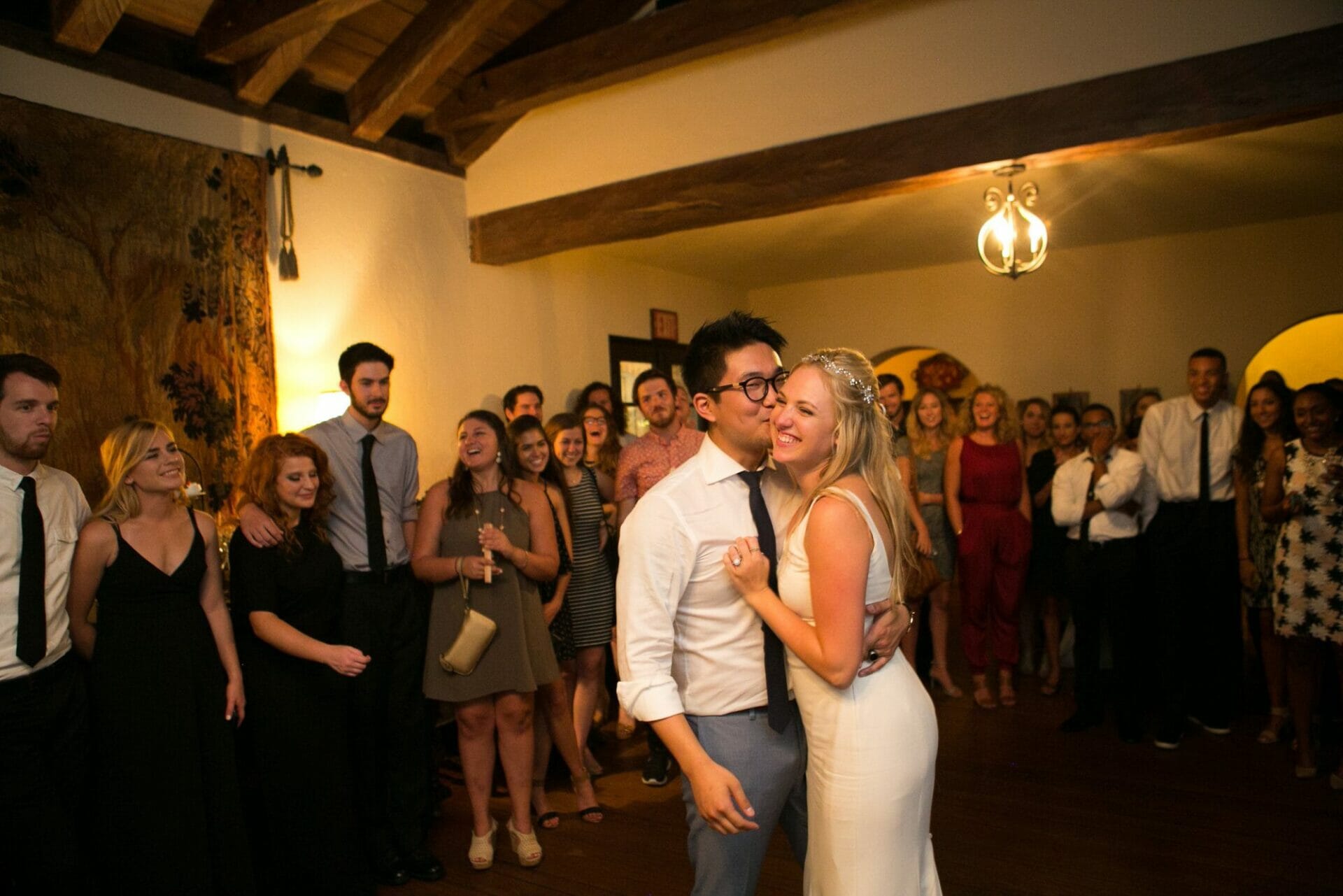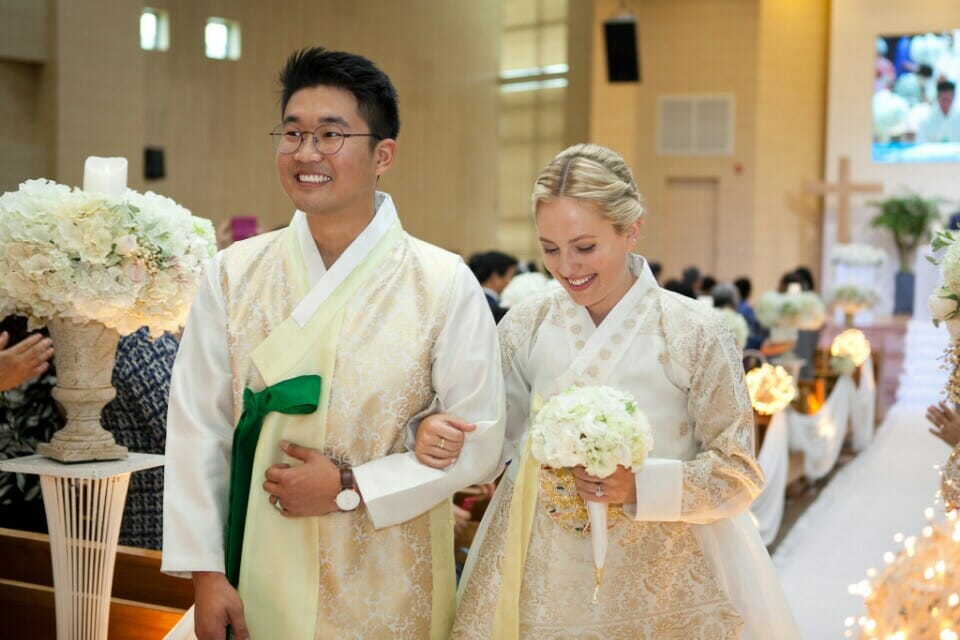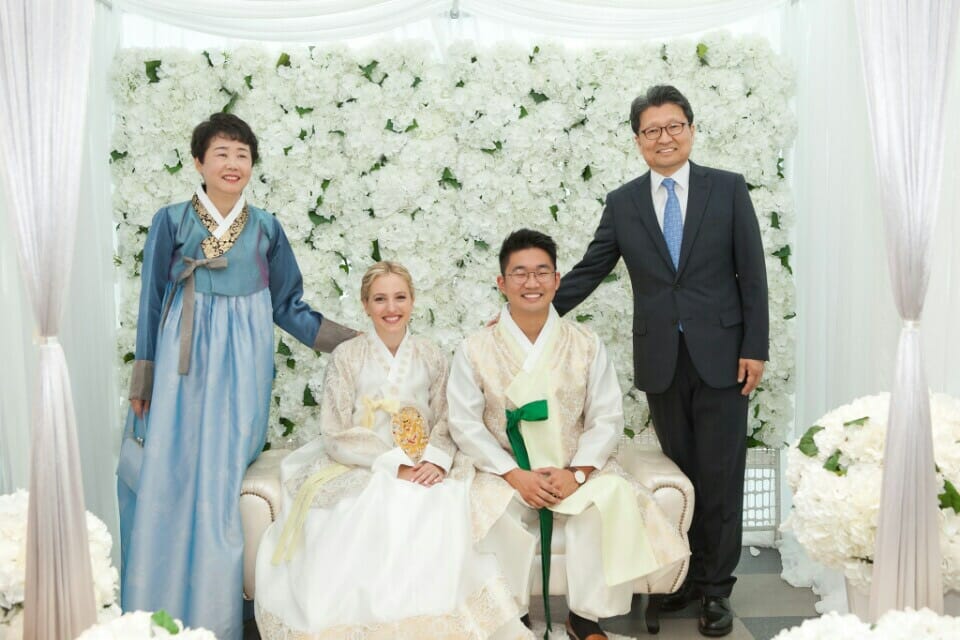Every family comes with their own set of traditions and customs. When planning a wedding, incorporating expectations on both sides of the family can be complicated enough. Cross-cultural weddings add a whole new level of complexity. But this unique experience provides a way for couples to truly appreciate and understand their diverse cultural backgrounds.
photography of Lim Wedding by Tammy Swales / written by Annalee Mutz

AN UNSTEADY START
“At first my parents didn’t really like Emily,” Jet Lim says as he recounts the earlier days of dating his now wife, Emily Lim. Jet’s family is from South Korea while Emily is from upstate New York. A born and raised all-American girl, Emily did not necessarily fit the mold of an ideal Korean wife that Jet’s parents had aspired for him. “That was the hardest part for us at the beginning,” Jet says.
Jet was born in Virginia and moved to Korea when he was in the third grade. “But I was a troublemaker and didn’t connect with Korea very well,” he admits. So, he went back to the United States on his own, eventually attending Auburn University and then later transferring to Southeastern University where he first met Emily.
Jet and Emily were head-over-heels for each other, captured by the thrill of a budding romance that later matured into a serious relationship. However, Jet’s parents were not initially on board with their son’s new relationship. “In Korea, it’s about preserving our culture,” Jet says. Emily is not Korean, and this was not what Jet’s parents had anticipated for their family.
“They were sad. My dad loves Emily, but he can’t really speak to her; she’s all the way across the country and she doesn’t speak Korean,” Jet says. With the talks of marriage present in their relationship, this was a devastating situation for Jet and Emily to navigate through. “My parents came along, but it was because we had to slowly prove them wrong,” Jet says.
“It was really hard for me because I’m such a people person,” Emily says. “However, it’s been cool to see their opinions change.”
Jet and Emily dated for about a year and a half before Jet popped the big question. Six months later, they got married in Winter Park, Florida. Two weeks after the wedding, they got married again in South Korea.
TWO WEDDINGS ARE BETTER THAN ONE
There are many different ways to go about a cross-cultural wedding, and having two separate ceremonies in order to incorporate both cultures is not an unheard-of idea. So, why did Jet and Emily decide to have two weddings? “My mom tricked me,” Jet jokes. “But it ended up being really cool.”
“We ended up loving it,” Emily says. She worked closely with her family to plan a midsize wedding in Winter Park at a venue called Casa Feliz. This was a fairly traditional American wedding that took into consideration much of Emily’s large family. “We didn’t incorporate any real Korean traditions into our American wedding, because we knew we were going to have our wedding in Korea, too.”
Although they worked closely with Emily’s family to plan the American wedding, many of Jet’s family also attended this ceremony even with the Korean one nearing close behind it. “They loved it,” Jet says. His parents arrived and brought a gift for Emily’s parents — a common tradition in Korea for the parents of the groom.

A true cultural experience for the Lim family, this was Jet’s parents’ first American wedding, so they were not accustomed to some common Western wedding traditions. “My mom was really awkward during the mother-son dance,” Jet says. “But she had fun with it, too.”
However, when it came to the Korean wedding, Jet’s parents were far from hands off with the planning process. “In America, it’s mostly the bride and her parents that plan the wedding. In Korea, it’s not like that,” Jet says.
In Korea, it’s common for both sides of the family to split the costs. It is also common for the newlyweds to receive cash from their guests, rather than gifts. The parents typically take the money received and use it to pay for the wedding. The remaining money is then used to prepare a place for the couple to live. Depending on what they can afford, this usually covers the first year of living. “So my parents covered all the Korean wedding,” Jet says. “They used the cash to pay for the wedding and what was left was used as a down payment for a house and a dryer.”
THEIR BIG KOREAN WEDDING
After Emily and Jet tied the knot in Florida, they hopped on a plane and headed out for their honeymoon. Two weeks later, they were walking down the aisle all over again. Only, this time, in South Korea.
“We had no part in the planning process for the Korean wedding,” Emily says, “which was nice. I was all the way across the world. I wouldn’t have been able to be a part of it anyway.” So with their outfits chosen for them and the details set in place by the Lim family, Jet and Emily arrived in Seoul ready to take on round two of the wedding festivities — this time a bit different from the first.

“There weren’t a lot of similarities between the two weddings,” Emily says. She started her wedding day like most brides, getting her hair and nails done. Afterwards, she finished getting ready by putting on her wedding dress, the traditional Korean attire called a hanbok. “Before the ceremony, I went alone to this room with a wall of flowers and a bench in front. I sat there for about an hour as people showed up for the wedding.”
“It’s traditional for people to come about an hour before the wedding,” Jet adds.
Guests arrived early to the Lims’ wedding to greet the bride and family before the ceremony. “They were kind of nervous being around me,” Emily says. “My sister-in-law was there to help translate for me, but guests were still really nervous. People didn’t really talk to me a lot. I was just sitting there while they took pictures of me.”
Jet and Emily’s Korean ceremony was much larger than their one back in Florida. “It’s normal for the ceremony to be big,” Jet says. In order to symbolize that they were already married, Jet and Emily walked down the aisle together for this ceremony which was officiated in both English and Korean. During the ceremony, they also had someone sing a love song to the couple.
“It’s common for someone to sing to you at the wedding,” Jet says.
“To me it was awkward, but he was a very good singer,” Emily says.
Their vows were then sealed with a bow. “We did a bow to Jet’s parents,” Emily says.
“She would bow. I got completely on the ground, like a full bow on my hands and knees,” Jet says.
Instead of a kiss, the ceremony concluded with the couple bowing to each other.

HONORING FAMILY
Considering family dynamics is just another detail to worry about when planning your big day. But, as the couple is preparing to join together every aspect of their lives, this attention to familial customs can add tremendous value; taking into consideration the cultures of both sides of the family is very honorable. Likewise, it can also be an eye-opening experience for the couple.
“The Korean wedding didn’t really have our personalities. We did that to honor [Jet’s] parents, and that was really important to them,” Emily says. The two are thankful for their cross-cultural wedding experience and have gleaned great insight from the experience.
“I actually really enjoyed having two weddings,” Jet says. Again, there is more than one way to organize a cross-cultural wedding, and two ceremonies may not always be the route a couple chooses. “If you want to combine, you have to be flexible,” he advises. “If you’re blending two cultures into your wedding, you have to be understanding and willing to compromise.”
So, although a wedding is a time for the families to come together, it’s also about celebrating the couple. Blending together the desires of each can be more difficult to decipher when two entirely different cultures are involved, “because customs mean different things to each other,” Jet says.

“There are some things that might be considered rude in one culture that wouldn’t be in another,” Emily adds. For all those involved in the wedding, clear expectations are crucial, especially from the bride and groom themselves.
Jet’s parents have truly accepted and welcomed Emily into their family. “The wedding was really good for my relationship with his parents. They got to spend more time with me and get to know me,” Emily says. And her understanding of Jet’s cultural background also grew from this experience. “I think the Korean wedding helped a lot. I learned more about the culture while I was over there. I fell in love with Korea.”
Jet and Emily’s cross-cultural wedding provided a means for the couple to fully explore their diverse backgrounds and honor their families in the process.
[separator type=”thin”]
Top Tips For Planning a Cross-Cultural Wedding / Blending Traditions
written by Brittany Cole | photography by Tina Sargeant
Local wedding planner Brittany Cole from Eventrics Weddings has planned dozens of cross-cultural weddings. Although there is no one formula that works for all couples, she has gleaned insight into the top tips that will help any couple on their big day.

1. Structured family discussions /
It’s important to sit down with both families to outline the most important cultural details of the weekend. Both families should elect a spokesperson to act as the cultural expert for reference. This is crucial as it will determine everything from guest count, timeline of events, and location. Since there may be language barriers, I encourage a clear and consistent communication throughout the planning process to ensure all parties remain in the loop and comfortable with the continued progress.
2. Budget outline /
The budget should be discussed from the beginning with both families. Each side should speak on what they are comfortable contributing and what aspects are most important.
3. Know your date /
I always recommend you research your date extensively before finalizing. Depending on where the celebrations will take place, you might want to confirm there are no major conventions or other city events that will impact your overall guest experience and privacy.
4. Choose your venue /
With most cross-cultural events, I’ve found that it’s best to select a venue that allows outside catering. Be sure to ask the event coordinator directly if they have experience with cultural events and if they partner with outside caterers of your choice in the area.
5. Hire your team /
Choosing your “core team” of vendors for your wedding weekend is very important. Not only should they align with your overall vision and budget, but they should also be enjoyable to work with. Be sure you see eye to eye with the vendors you hire — you could be working with them for a year … sometimes more!
6. Invest in on-site management /
I cannot stress enough how important it is to have an experienced on-site wedding coordinator to oversee your investment. It’s important to ensure that your wedding will go off without a hitch given all the time spent planning and large financial investment. Also, the bride and groom can relax and enjoy the celebrations!

